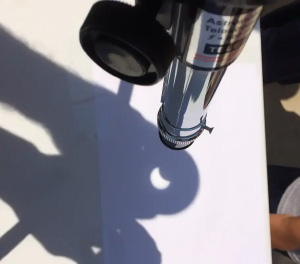Science Curriculum
Our Approach
“The proper study of the sciences shares pedagogical principles classical education already employs in the teaching of the other liberal arts: mastery learning and subject integration.” (Mays, 2015). Our science curriculum will focus on the application of the scientific method with a hands-on approach. This approach is designed to help students develop an understanding and appreciation of not just the facts of science, but also the process of how scientists have arrived at these facts. Our program makes extensive use of Next Generation Science Standards (NGSS).
8th Grade
General Science
This General Science course is a study of the earth’s atmosphere and geology and the solar system and space. The physical science part of the course focuses on atomic theory, physical versus chemical changes, electricity, and magnetism. The emphasis in this course is hands-on: we’ll make a tube of hydrogen pop (chemistry) and create a motor that spins a fan and moves a small car (electricity). The ecology part of the course will focus on adaptations and interrelationships. The course is full of surprises, such as teaching that Northern Kentucky was once near the equator under a tropical sea (plate tectonics) and that we can create fun games that simulate real world ecology. We will learn the engineering skills to build and test a popsicle bridge and launch a water bottle rocket.

9th Grade
Biology
This biology course is a study of cell structure and function, genetics, and evolution. We’ll follow the chronology of the discovery of cells and genetics. This approach gives students a better appreciation of the significance of the discoveries by humanizing them in a story-like fashion. Next we’ll focus on natural selection as the driving force of evolution and what Darwin meant when he wrote: “grandeur of this view of life….from so simple a beginning endless forms most beautiful and most wonderful have been and are being evolved.”
Our hands-on experiences include a forensics simulation using the process of DNA sequencing to identify a crime suspect and the protein synthesis game. And, we’ll view a few of the amazing programs made by Sir David Attenborough.

10th Grade
Chemistry
Students experience the wonder of chemistry with numerous physical and chemical reactions such as watching dry ice sublimate or the explosion of hydrogen gas. This promotes wonder and curiosity that leads to the intellectual energy to explore ionic and covalent bonding and the significance of the concept of electron configuration and valence. Critical thinking is experienced in many forms, such as putting together a Periodic Table the way that Mendeleev originally did. The chemistry course reviews atomic theory, which leads to the Periodic Table of Elements. We’ll appeal to the imagination by drawing atomic models and chemical bonds. We connect the practicality of algebra by learning how to create and balance chemical formulas and equations. Students will apply math background through dimensional analysis of the molar concept.
11th Grade
Physics
Watching a Geiger counter react to a radioactive substance, students cannot help but wonder at the source of radioactivity. That is just one of the numerous imagination-inspiring activities that form the core of the physics course. Students will listen to the sounds produced by a tuning fork, watch wave interference patterns, and create complex electrical circuits. But they will also participate in a water rocket challenge to see the practical applications of Newtonian mechanics. We connect the practicality of algebra and geometry by calculating the mathematics of the activities observed.
12th Grade
Science Elective - Advanced Biology, Advanced Chemistry, Advanced Physics, Marine Biology/Zoology, or Astronomy
Students will have the opportunity to choose from several science elective courses their senior year.
Mays, J. (2015, May 21). Science in the Classical School. Retrieved from https://www.memoriapress.com/articles/science-classical-school/
